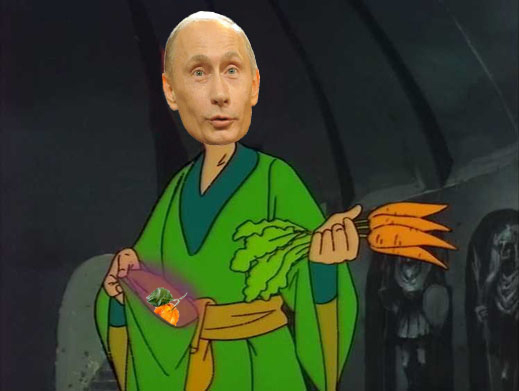
By John Helmer, Moscow
It’s not often that a king of venerable line comes to Moscow to bargain over the price of a tangerine. It’s also unusual that President Vladimir Putin tells his state guest that he doesn’t understand why the trade between their two countries has fallen sharply. That’s a question which should have been answered in his briefing papers, especially since the trade has already begun to recover strongly. So what exactly did King Mohammed VI of Morocco negotiate with President Putin at the Kremlin last week?
Mohammed, whose Alouite dynasty has ruled Morocco for 350 years, hasn’t been to Moscow since 2002. Although his officials meet their Russian counterparts at an annual inter-government ministerial conference, the king hasn’t patronized the meeting before. Last December the Moroccan ambassador to Russia, Abdelkader Lecheheb, told the state press agency Sputnik that trade was the priority in the relationship between the governments.
In Putin’s remarks at their ceremonial welcome on March 15, he told Mohammed: “There is a great deal our colleagues and we have to discuss. We have wonderful relations with Morocco, though it is strange that we have been seeing a certain reduction in trade, specifically in certain traditional Moroccan goods. I do not understand the reasons for the drop in shipments of Moroccan fruit, oranges or tomatoes to Russia, particularly given the limitations in the supply of these products from the European Union countries.”
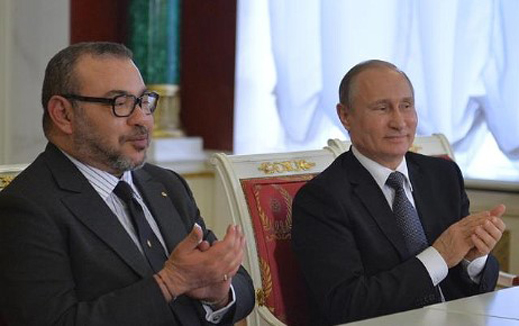
Source: http://en.kremlin.ru/events/president/news/51516
Putin was referring to this tabulation of the import-export data. They show that Russian importation of Moroccan fruits is roughly double the value of the vegetable imports; both hit peak in 2014. Last year, the decline in the trade amounted to 20% for both.

Overall, the trade between Russia and Morocco is very small – less than 1% of Russia’s aggregate trade turnover. Government reports regard Morocco as a “peripheral market with low effective demand.” The peak year for the bilateral trade was 2011. But last year turnover plunged 34%, as Russian exports of oil and petroleum dropped sharply following the bankruptcy of the Moroccan refinery company responsible for handling the Russian products. Sulfur and coal have continued as Russian exports.
In the flow of Moroccan imports to Russia, tangerines and mandarins comprise 36% of value; textiles, 25%; vegetables, 20%.
RUSSIA-MOROCCO TRADE TURNOVER, EXPORTS AND IMPORTS, 2010-2016
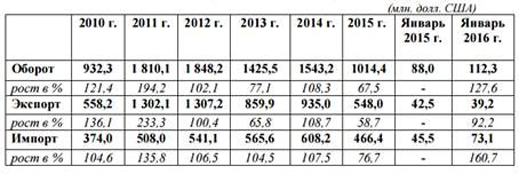
Source: Ministry of Economy, Trade Department: http://economy.gov.ru/minec/about/structure/depTorg/2016150302
Industry sources in Moscow identify three Russian companies as the largest importers of fruit and vegetables from Morocco – Globus, Baltfruit, and Nevskaya. They all answer their telephones; they all refuse to comment on the trade.
Tatiana Getman of APK-Inform, an analyst of the Russian fruit and vegetable market, explains what has been happening; APK-Inform is a leading consultant for agribusiness in Russia, Ukraine and the CIS countries. “In 2015, as compared with 2014, ” Getman says, “for tomatoes and tangerines there was a marked decline, on average by 20%. However, for kiwi, persimmon and apples, the supply increased significantly. For example, Russia imported from Morocco five times more pears; almost 8 times more kiwi. Apple shipments grew by 35 times! The decline in shipments in the traditional Moroccan positions — tomato and tangerine — is due to a decrease in the consumption of these products in the whole country. This is because with the rouble devaluation, the [product] price has risen over the previous year, but the population has become poorer. The growth in supply for apples, kiwi, pears and persimmon, is related, in our opinion, to the re-export of these products from the EU.”
Philip Owen of Volga Trader, a leading analyst and broker for the Russian agricultural industry, adds that “transport through the Netherlands might be an issue. Going via the almost defunct Dubai Flower Market would be expensive. It is clear from comparison with the cheese market that Russian retailers prefer to take higher prices rather than replace EU supplies. Consumption in cheese fell almost matching the loss of European Union supply. There was no replacement with imports from India or Pakistan or New Zealand, despite low prices.”
Alexander Tkachev, the Russian Minister of Agriculture, said during the meetings with the Moroccan delegation last week said that Morocco is one of the suppliers Russia is looking to in order to replace the European Union supplies now subject to counter-sanctions. For more on the EU ban, read this. Serbia, Brazil, Tunisia, Iran, and several East Asian countries have also pledged to increase exports to Russia, Tkachev added.
The minister’s spokesman has also noted that there has been a pickup in the Moroccan food shipments since the start of this year. “From the start of the year to March 6, imports from Morocco to Russia have increased by 43.9% – to $126.6 million, compared to the same period of 2015. In particular, the volume of tomato supply has increased by nearly three times up to 44,000 tonnes. Citrus fruit has grown by 28% to 67,000 tonnes. Morocco is strategic for our market as a supplier of tangerines, oranges, and tomatoes. The [increase in] supply of Moroccan food since the beginning of 2016 has had a positive impact on the balance of supply and demand on the Russian domestic market.”
Either Putin was misinformed about this shift in the Moroccan fruit trade, or else he wanted to divert attention from another priority in the talks with Mohammed. Although a French political protectorate until recently, and an American military one still, Morocco’s leadership traditionally views itself as superior to the sheikhs of the Arab Gulf. If they, together with Egypt’s and Syria’s leaders, are viewed in Rabat as on increasingly closer terms to Putin than Mohammed considers himself, he is bound to rectify what he sees as the balance. In the Moroccan public version of the talks at the Kremlin, that is exactly what the king reportedly achieved with Russia’s “recognition” of the importance of his role in Libya, Yemen, Syria, and Palestine.
The Kremlin notice identified several strategic items in the talks: “Intergovernmental agreements were signed on air traffic, on cooperation in environmental protection and the rational use of natural resources, on cooperation in marine fishery, on support and mutual protection of capital investment and on mutual protection of classified information in the military and military technology areas. Also signed was a Russian-Moroccan statement on combatting international terrorism. Other joint documents deal with cooperation in energy, geological prospecting and development of mineral resources, in tourism, cooperation between Museums of the Moscow Kremlin and the State Hermitage Museum with the National Museum Foundation of Morocco, as well as cooperation in Islam.
At the conclusion of the day’s negotiations, Foreign Minister Sergei Lavrov issued a statement. “The meeting [with Putin] was in several formats: in narrow, expanded and in private. All conversations were friendly and frank; they took place in a very benevolent and confidential atmosphere. All the main aspects of our cooperation have been touched.”
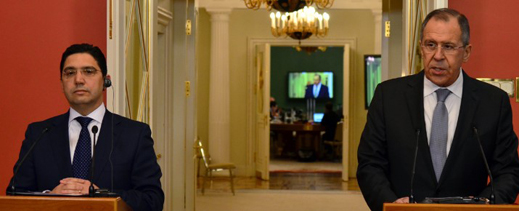
Source: Russian Foreign Ministry: http://www.mid.ru/web/guest/meropriyatiya_s_uchastiem_ministra/-/asset_publisher/xK1BhB2bUjd3/content/id/2149106
In his press conference with Moroccan deputy foreign minister Nasser Bourita, (above, left), Lavrov (right) put his emphasis on war over trade. “Taking into account the intense situation in the Middle East and the North of Africa and intensification of the terrorist threat, special value has signing of the joint Russian-Moroccan statement on counter-action to the international terrorism. For the reasons connected with the environment in world economy last year, our commodity turnover has decreased a little. On both sides the determination to improve situation has been shown.”
Lavrov also addressed the current controversy between Morocco and the United Nations (UN) Secretary-General Ban Ki-moon over the status of the Western Sahara to the south of Morocco, its partition by the Moroccan military, and the operations of forces of the Sahrawi Arab Democratic Republic (SADR, also known as Poliario). According to Lavrov, the public statements were “a recent misunderstanding”, while he reiterated the traditional Russian balance between the claims of Morocco and SADR, and the role of the UN to resolve their conflict.
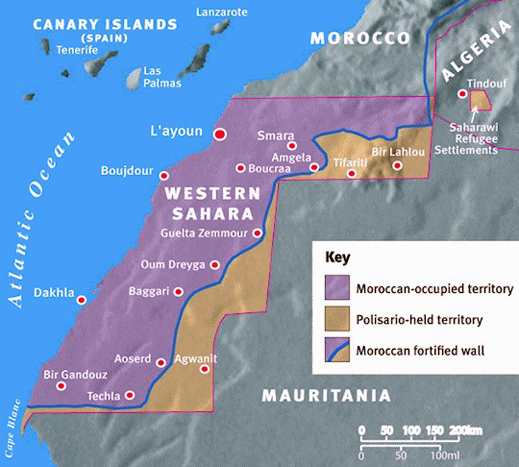
According to Lavrov, “Russia and Morocco support strict observance of the principles of international law, respect for the central role of the UN. Our countries are committed to resolution of conflicts and disputes exclusively peacefully, without intervention from the outside… The Russian side has confirmed its principled stand on the West Saharan settlement. The position of yours faithfully is understood by our Moroccan colleagues. From lack of alternative we will also proceed in search of such decision as will be exclusively political; acceptable to all parties; and to proceed in line with the principles and standards of the Charter of the UN…We consider that the UN, despite the recent misunderstanding, must continue to play a constructive and equidistant role, and to try to obtain [outcomes] which will take into account the interests of all parties and to provide a balance of these interests.” For a Russian expert review of the current Russian position towards the Western Sahara conflict, read this.
At the moment Russian military analysts consider Morocco remote from Russia’s strategic priorities in the Mediterranean and Middle East; they acknowledge that in the Maghreb Morocco is traditionally hostile to Moscow’s alignments with Egypt, Libya and Algeria. They have yet to analyse the implications of Russian arms supply to Morocco and intelligence-sharing, which were also on the agenda of last week’s negotiations between Putin and the king. Last September, the Kurganmashzavod company, part of the Tractor Plants machine-building consortium, announced it was already in talks for delivery of 60 BMP-3 combat vehicles to Morocco. No outcome of this deal was mentioned last week.
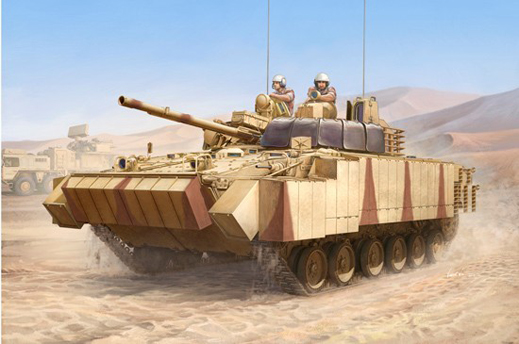
Source: http://www.army-technology.com/projects/bmp-3/
The United Arab Emirates, Kuwait, Cyprus, and Indonesia also operate the machines in their armies.
Russian sources close to Gazprom note that Morocco has huge gas reserves; if fully developed, they can begin to supply Western Europe or the US, challenging current market positions of Nigeria, Algeria, Qatar, and Russia. This prospect is acknowledged in the official communique last week. “The Russian Federation and the Kingdom of Morocco will strengthen bilateral cooperation in the energy sector, including supplies of liquefied natural gas (LNG), creation of gas infrastructure, exploration of hydrocarbons, construction and operation of power generation as well as renewable resources.”











Leave a Reply